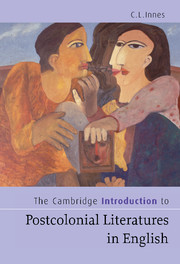Book contents
- Frontmatter
- Contents
- Preface
- Chapter 1 Introduction: situating the postcolonial
- Chapter 2 Postcolonial issues in performance
- Chapter 3 Alternative histories and writing back
- Chapter 4 Authorizing the self: postcolonial autobiographical writing
- Chapter 5 Situating the self: landscape and place
- Chapter 6 Appropriating the word: language and voice
- Chapter 7 Narrating the nation: form and genre
- Chapter 8 Rewriting her story: nation and gender
- Chapter 9 Rewriting the nation: acknowledging economic and cultural diversity
- Chapter 10 Transnational and black British writing: colonizing in reverse
- Chapter 11 Citizens of the world: reading postcolonial literature
- Notes
- Glossary of terms used (compiled by Kaori Nagai)
- Biographies of selected postcolonial writers (compiled by Kaori Nagai)
- Brief colonial histories: Australia, the Caribbean, East Africa, India and Pakistan, Ireland, West Africa (compiled by Kaori Nagai)
- Select bibliography
- Index
Chapter 10 - Transnational and black British writing: colonizing in reverse
Published online by Cambridge University Press: 05 June 2012
- Frontmatter
- Contents
- Preface
- Chapter 1 Introduction: situating the postcolonial
- Chapter 2 Postcolonial issues in performance
- Chapter 3 Alternative histories and writing back
- Chapter 4 Authorizing the self: postcolonial autobiographical writing
- Chapter 5 Situating the self: landscape and place
- Chapter 6 Appropriating the word: language and voice
- Chapter 7 Narrating the nation: form and genre
- Chapter 8 Rewriting her story: nation and gender
- Chapter 9 Rewriting the nation: acknowledging economic and cultural diversity
- Chapter 10 Transnational and black British writing: colonizing in reverse
- Chapter 11 Citizens of the world: reading postcolonial literature
- Notes
- Glossary of terms used (compiled by Kaori Nagai)
- Biographies of selected postcolonial writers (compiled by Kaori Nagai)
- Brief colonial histories: Australia, the Caribbean, East Africa, India and Pakistan, Ireland, West Africa (compiled by Kaori Nagai)
- Select bibliography
- Index
Summary
The previous chapter considered some of the ways in which postcolonial writers have revisited concepts of nationality and community by attending to the diverse histories and cultures of the areas they grew up in, histories which precede and accompany European colonization. Many of those writers, including Abdulrazak Gurnah, Wilson Harris, Michael Ondaatje and Salman Rushdie, had emigrated to Britain or Canada, and to some extent their attention to those early multicultural communities is influenced by their location in the more recent immigrant communities which have become a feature of those countries since World War II. Australia, Britain and Canada had all encouraged large-scale immigration to rebuild their postwar economies and supplement diminished labour forces. In Australia the immigrants came mostly from Britain and Europe, and until the 1970s non-European peoples were turned away under the White Australia Policy; Britain, on the other hand, actively recruited workers from the West Indies and the Indian subcontinent to service transport systems, the new National Health hospitals, and the steel and cotton factories. Consequently, although all three still have predominantly white populations of Anglo-Saxon and Celtic origin, Australia, Britain and Canada provide different contexts for the development of multicultural societies. Moreover, as the primary colonizing power, seen and seeing itself as the metropolitan centre, or as the ‘mother country’, Britain also differs significantly from Australia and Canada as a symbolic and actual site for those who had formerly been her imperial subjects.
- Type
- Chapter
- Information
- Publisher: Cambridge University PressPrint publication year: 2007



